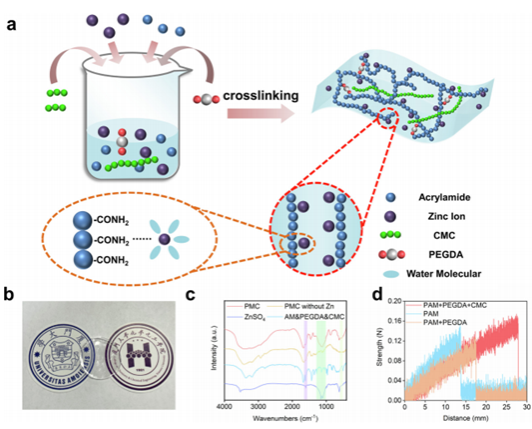我室赵金保教授在 Energy Storage Materials 上发表论文:Achieving ultra-long lifespan Zn metal anodes by manipulating desolvation effect and Zn deposition orientation in a multiple cross-linked hydrogel electrolyte
摘要:Aqueous zinc-ion batteries (ZIBs) have received extensive attention due to the intrinsic advantages of high safety, low cost and environmental friendliness. But detrimental side reactions and dendrite problems resulting from high desolvation penalty and inhomogeneous Zn2+ flux at the interface severely hindered their practical applications. Herein, a novel polyacrylamide-poly (ethylene glycol) diacrylate-carboxymethyl cellulose (PMC) hydrogel electrolyte is designed to overcome these obstacles through reducing the desolvation energy barrier and guiding the preferential orientation of Zn deposition simultaneously. Theoretical calculation and experimental results reveal that the desolvation activation energy of the PMC hydrogel electrolyte (36.42 kJ mol−1) is substantially lower than that of conventional ZnSO4 aqueous electrolyte (62.31 kJ mol−1) due to the regulated Zn2+ solvation structure. Based on the high binding energy between amide groups and Zn2+, polymer chains in PMC also serve as facile Zn2+ transport channels to guide the uniform deposition behavior on the Zn (002) crystal surface, which is verified by the grazing incidence XRD analysis. Consequently, an ultra-long cycle life of 5000 h with a high coulombic efficiency of 99.5% is achieved by using the PMC hydrogel electrolyte. Considering the simple one-pot synthesizing method, the PMC hydrogel electrolyte provides new opportunities for developing practical ZIBs.

文章链接:https://www.sciencedirect.com/science/article/pii/S2405829722002008